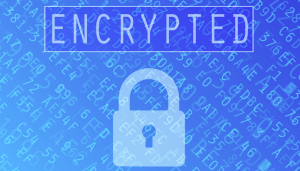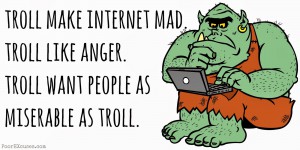The Internet enables people to operate online, anonymously. When this capacity is used for damaging activities, what should be done?
I’m a fan of being able to communicate online without revealing your identity. This is because I’ve known so many whistleblowers who are subject to serious reprisals. As soon as they go public, they are cut off from further information, and the reprisals divert attention from the issue they spoke out about. Leaking anonymously is usually a better option, reducing or eliminating reprisals, while the leaker can remain on the job and, if necessary, leak again.
Leaking can be done in various ways. The Internet makes it easier. Setting up a Yahoo email account at a public library is one option. Another is using encryption, including the Tor browser to hide web activity.
Then there are dissidents in countries where speaking out against the government can lead to dismissal, arrest, imprisonment and torture. Encrypted communication can be a vital tool for campaigners who are up against a repressive regime.
However, online anonymity can be used for other, less noble purposes. I was reminded of this by reading Jamie Bartlett’s book The Dark Net: Inside the Digital Underworld. Bartlett, a researcher at the think tank Demos, knew about nefarious activities on the Internet and decided to investigate further. He pursued unfamiliar corners online, tracked down individuals who are involved, met them face-to-face and learned about how they operate.
The Dark Net is a fascinating account. It is engagingly written and addresses a series of important topics, including trolling, racist organising, child pornography and illegal drug sales. Bartlett doesn’t try to force his views on the reader, but rather encourages thinking about the pros and cons of online anonymity.
Trolling
Trolling involves entering online discussions and seeking to cause trouble, upsetting people by making rude comments or trying to disrupt an entire discussion. Trolls may see success, from their viewpoint, as provoking an angry response.
Bartlett, as well as telling about cases of trolls who were exposed and prosecuted, was able to meet with a self-identified troll and discuss his motives and methods. Trolls may be quite ordinary people offline, but online they morph into nasty personas, sometimes taking numerous identities. They may pretend to adopt views contrary to their own and infiltrate forums in order to discredit them, for example pretending to be a racist making really objectionable comments.
Trolling has been around ever since the early days of computer-to-computer interaction, the precursors of the Internet. It is fostered by what’s called the online disinhibition effect, which means that when you are separated from people in time and space, you are more likely to behave without the usual restraints that apply when talking to someone face-to-face.
Bartlett entered the notorious /b/ board of the image-sharing website 4chan, where participants, almost all anonymous, vie with each other in making ingenious insults and outrageous statements. When a teenage girl entered for the first time, she was seen as a legitimate target. She was encouraged to post revealing photos of herself. Board regulars managed to determine her offline identity (“dox” her) by using cues in the background of her photos, and proceeded to send her photos to her parents, her classmates and friends.
This was what /b/ calls a “life ruin”: cyberbullying intended, as its name suggests, to result in long-term, sustained distress. It’s not the first time that /b/ has doxed camgirls. One elated participant celebrated the victory by creating another thread to share stories and screen grabs of dozens of other “classic” life ruins, posting photographs of a girl whose Facebook account had been hacked, her password changed, and the explicit pictures she’d posted on /b/ shared on her timeline. (p. 20)
Alarmingly, these trolls see nothing wrong with harming people. She deserved it, they think, because she was so foolish. But, as Bartlett notes, trolls can cause severe damage to a person’s life, even causing them to commit suicide. And it’s all done anonymously. Only very seldom is a troll held to account.
Porn
Another use of the Internet is for circulating pornography, for which there seems to be an unending demand, with porn sites constituting a good proportion of what’s on the web. However, the traditional porn industry is not thriving. The reason is the availability of webcams, enabling a huge increase in self-made sex displays.
Bartlett made contact with a successful online performer, Vex, met her in real life and attended one of her shows, watching her (and, on this occasion, two other women) perform using the site Chaturbate. Watchers can sign in for the show and express their appreciation through payment of Chaturbate tokens. Bartlett watched a particularly lucrative show.
I ask Vex why she thinks she is so popular. “Traditional porn tends to be standardized and unrealistic,” she replies. “I guess I’m a real person in a real room.” This view is one put forward by Feona Attwood, professor of cultural studies at Middlesex University: “It’s a better kind of porn: somehow more real, raw, and innovative than the products of the mainstream porn industry.” (p. 171)
Something more disturbing is the availability of child porn on the Internet. It is hidden well, using encryption, but there is lots of it. Bartlett tells how child porn was in decline in the 1980s, seen by law enforcement as a low priority. The Internet provided a huge boost to the availability of child porn, with interest piqued by “gateway” images of older teenagers, gradually leading to interest in images of younger children. This in turn stimulated greater supply, itself made easier for dark-side entrepreneurs.
Bartlett met “Michael”, a seemingly ordinary middle-class man, who started watching more pornography in his 40s, with an interest in youthful bodies, and gradually moved from legal to illegal pornography. Then he was caught, and his life upended.
Bartlett provides a lot of context, quoting various sources and authorities, for example noting that the perpetrators of most sexual abuse continue to be family members and that evidence about the connection between watching child porn and becoming an offender is “inconclusive”. He also met with British police who specialise in tracking down online child porn so it can be shut down and the producers and users prosecuted. The British teams have been fairly successful in closing down British operations, but there are numerous offenders in other countries, and in many of them the police don’t care or are bribed not to interfere.
Anonymous commerce
It is now possible to buy and sell goods using anonymous digital currency, of which the best known is bitcoin. Libertarian-oriented programmers pour enormous energy into designing digital currencies that enable anonymity for sellers and purchasers, at the same time providing records of transactions.
Bartlett purchased some marijuana online using a prominent drug-sale site, Silk Road 2.0, that offers a wide variety of pharmaceutical and illegal drugs. He didn’t use his credit card, of course, but rather bitcoin. He did use his home address, but he could have used some other address. Only after receiving his gram of marijuana through the post did he go online to note this, so the seller could receive the payment, which had been put in escrow. Sellers are rated by buyers, just like on Amazon, providing a trust-based system in which everyone is anonymous. The site takes a small commission, but no taxes are paid. Indeed, as Bartlett discovered, avoidance of taxes or any other government control is a key motivation of the programmers designing anonymous currencies.
Pro-ana
Bartlett also delved into the disturbing world of websites providing support for anorexics. Many of these provide assistance and encouragement to overcome this illness, but some, the so-called “pro-ana” sites, provide a different sort of support: to become ever thinner. The Internet has enabled anorexics to interact with each other, to share pictures of their emaciated physiques (and say how attractive they are), to tell about their diets (how little they eat in a day) and their struggles against eating, and to encourage each other to maintain dietary discipline for the goal of thinness. Although anorexia predated the Internet, the pro-ana sites provide a new source of encouragement for dangerous weight loss and thus a continuation or accentuation of the illness.
Alternatives?
Bartlett, through his tour through dark parts of the net, highlights negative aspects of online anonymity. He entered this world recognising the positives, especially the capacity to organise against repressive governments. However, even when examining the less positive areas, such as child porn and pro-ana sites, he maintains an admirable suspension of judgement, in part because he is genuinely impressed by the complexity of the issues. None of the areas turned out to be as one-dimensional as he anticipated.
Spy agencies do not like online anonymity. In the US and Britain, they have been pushing for encryption systems to have backdoors so the agencies can read anyone’s email. They argue this is necessary for tackling terrorism, with child porn offering a useful supplementary argument. However, the case for backdoors is fundamentally flawed, because terrorists are not going to use an insecure system. What the agencies really want is to maintain surveillance over citizens.
An underlying assumption in the contest between spy agency agendas and their opponents who defend civil liberties is that online anonymity is a key to enabling abuses. However, while it might seem on the surface that online anonymity is central to trolling, racist organising, child porn and the sale of illegal drugs, perhaps this attributes too much to the communications medium. After all, the postal system and the telephone are used by terrorists, criminals and paedophiles, but this does not mean governments should have the capacity to open all letters or listen to all calls, especially because such a capacity will enable more crimes, by the government itself, than it would prevent.
For each questionable use of the Internet, it is worth exploring a range of options for challenging the underlying social problem. Concerning the sale of illegal drugs: instead of trying to shut down online operations, a different approach is to decriminalise drug use and to introduce a range of measures to reduce the harmful effects of drugs. Specialists on challenging racism, anorexia and child pornography also can offer alternative pathways. The problems are in the “real world”, not just online. It is easy to point the finger at the Internet, the medium of communication, but more challenging to go to the roots of the problems.
Brian Martin
bmartin@uow.edu.au
Ted Mitew comments:
There is a noticeable stratification in access to real anonymity both in terms of the carrying layer and the destination:
[1] most people access the net through a layer of zero anonymity or pseudo anonymity at best, and their destination is not anonymous either;
[2] a small percentage access the net through a layer of high anonymity [VPN] and their destination may be somewhat anonymous (for example, members-only forums);
[3] an even smaller percentage access a completely different and highly anonymous network (for example, I2P) through an anonymous layer (VPN).
Groups 2 and 3 are not going to be affected by any government efforts to regulate anonymity, but ironically it is those two groups who have the know-how and will to defend anonymity.






